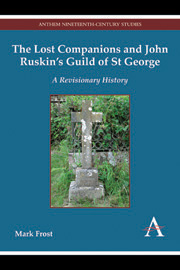Book contents
- Frontmatter
- Dedication
- Contents
- List of Illustrations
- Preface
- Frequently Cited Sources
- Introduction
- Chapter One Roots
- Chapter Two Glimpsing Eden: 1867–70
- Chapter Three ‘At Least a Beginning’: 1871–75
- Chapter Four Opportunities: 1875–77
- Chapter Five Dreams and Nightmares: 1878–81
- Chapter Six The Long Decline and the Great Dispute: 1882–1900
- Afterword
- Appendix Companions of the Guild of St George: Early Lists
- Notes
- Bibliography
- Index
- Frontmatter
- Dedication
- Contents
- List of Illustrations
- Preface
- Frequently Cited Sources
- Introduction
- Chapter One Roots
- Chapter Two Glimpsing Eden: 1867–70
- Chapter Three ‘At Least a Beginning’: 1871–75
- Chapter Four Opportunities: 1875–77
- Chapter Five Dreams and Nightmares: 1878–81
- Chapter Six The Long Decline and the Great Dispute: 1882–1900
- Afterword
- Appendix Companions of the Guild of St George: Early Lists
- Notes
- Bibliography
- Index
Summary
Given Graham's commitment to Bewdley, and his desire to be allowed a meaningful role in its work, it is ironic that after 1889 the estate there at last became a successful enterprise (Scott 1931; Wardle and Quayle 1989), and telling that this occurred only once George Baker's direct role in the estate was diminished and pioneer settlers were permitted to pursue independent work. That Bewdley is today the single surviving example of productive and thoughtfully sustainable agricultural work on Guild lands is a testament to Graham's hopes, and the finest vindication of Ruskin's early aspirations. Plans are now afoot at the Wyre Forest community and local area to begin to acknowledge and celebrate Graham's pioneering work, and his grave at nearby St Leonard's is now occasionally tended. While his absence at Bewdley has long been palpable, the consequences of his loss from the historical record have been yet more profound.
Reports of the land controversy appear to have spread amongst Guild members and Ruskinians in 1887–91. Yet Ruskin's early biographers, so assiduous in tracing sources and contacting those who had played any role in Ruskin's life, made no allusions whatsoever in the years after his death to serious allegations of neglectful management of Guild estates. It is perhaps telling that an impression was quickly given of shortscale or inactive estates. An early emphasis on the museum, one might suggest, may have been convenient not merely because of the ready availability of resources, and its prominence.
- Type
- Chapter
- Information
- The Lost Companions and John Ruskin's Guild of St George , pp. 221 - 224Publisher: Anthem PressPrint publication year: 2014

